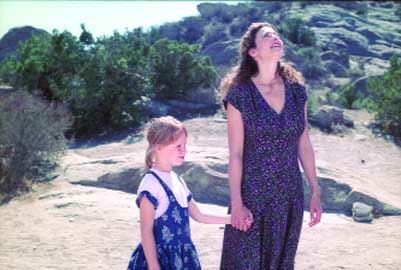The Rapture (DVD)

In the commentary to long-overdue DVD release of The Rapture (1991), actor Patrick Bauchau expresses his admiration for writer/director Michael Tolkin’s story, addressing the larger questions of life in a specific context with particular theological and ontological—if shifting—perspectives. To which Tolkin responds with his own doubts on the role of art. He questions whether the appropriate place to address “questions of the moment” is in drama or journalism. This leads to a discussion of Molière’s Tartuffe—to what degree the characters were bound to their cultural context and taken beyond it as types, to what degree sin and righteousness, sincere belief and duplicity, can coexist in individuals.
Later, Tolkin (a practicing Jew) questions whether “the project of art” is antithetical to “the project of religion,” and says we often treat art as a form of idol worship and allow it too much power. It’s something that makes him queasy about his work and whether he should concentrate more on his service to people and less on his service to art.
Actor David Duchovny (The X-Files) then enters the commentary, discussing John Milton’s Areopagitica and the author’s argument that responsible art must portray evil and expose it. This, in turn, leads to a brief discussion of the differing Jewish and Christian views of evil, which is part of the larger discussion of Old and New Testament views of God.
Such discussions may bore some, and they’ll certainly frustrate those looking for fully cogent academic dialogue. But as a conversation among artists relating their craft to profound issues of life and faith, I find it quite fascinating. And it’s emblematic of my fascination with this film.
-

-

-

-

-

-

-

-

-

-

-

-

-

-

-

-

-

-

-

-

-

-

-

-

-

-

-

-

-

-

-

-

-

-

-

-

-

-

-

-








































